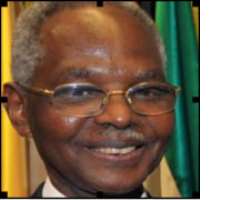Rilwanu Lukman at odds with oil majors over oil and gas reserves

Who is fooling who in the scheming over oil and gas reserves? It looks as if the government of President Umaru Musa Yar'Adua is taking too much on itself by confronting foreign interests and Nigerian sensibilities in order to scope more funds from oil revenue. Huhuonline.com has learnt from industry sources that much to the irritation of President Yar'Adua and Oil Minister Rilwanu Lukman, the western oil majors have struck back leading opposition to the Petroleum Industry Bill, which is now held up in the National Assembly.
Indeed, the western oil companies have made common cause with the governors of the Niger Delta states, who reject the Bill because it fails to give their states a larger cut of the oil revenues. Now it looks like the Bill will not be passed before the next elections.
Anxious for increased revenue without taking into serious consideration the possible reaction of foreign operators who are more adept in tax evasion when pushed to the wall, the government has been treading on a dangerous path of collision with established oil operators in the country in the sphere of tinkering with their fiscal operations and their propensity for profitable investments, as outlined in the Petroleum Industry Bill (PIB) now stalled in the national Assembly. The Bill allows for frequent variation and renegotiation of contractual rights for the government.
President Yar'adua and Oil Minister Rilwanu Lukman, had played hardball with the western oil majors when news leaked to the press that the Federal Government had opened up secret negotiations with the Chinese-owned CNOOC which had expressed interest in buying 23 concessions in Nigeria's onshore and offshore even as its Western competitors were busy re-negotiating the renewal of some of their under-exploited concessions in Nigeria. In effect, CNOOC seized the occasion to try to beat them to the draw by mounting a rival bid. The offer fell at the right moment for Abuja which was having trouble getting RoyalDutch/Shell, ExxonMobil, Chevron, Total and ENI to make the financial concessions that Nigeria was demanding.
Western oil groups suddenly discovered they were in competition with CNOOC, and that Abuja was implicitly asking them to improve their offers in order to win green lights to retain acreage they have operated for long years but not really worked, for security or financial reasons. Several of the blocks, notably those withdrawn from RoyalDutch/Shell, have become the object of litigation. The Anglo-Dutch major has filed two suits before the court in Port Harcourt to challenge the withdrawal of OML 71, 72, 74, 77 and 79 (on which Shell operates the EA field) and OML 13 in Ogoniland.
On the face of it, the speculation that China could take over US$50 billion worth of Nigeria's oil reserves currently licensed to Western oil majors is on the outer reaches of political fantasy. Although Western oil companies are privately dismissive of China's tactics, the start-up of negotiations on the oil licences has started to concentrate minds. If nothing else, it is a shrewd negotiating gambit by President Yar'adua's government, which has been besieged on all sides in domestic politics.
The government, perhaps in its wisdom or otherwise, has underrated the fury of the host communities who sincerely believe that higher revenue from oil is a free licence for wasteful expenditure by the government to develop other areas. The proposed PIB as it appears, sees OIL affairs as between the Federal Government and the foreign companies, leaving very little or no chance to the oil producing arrears and other Nigerians to own Nigerian oil. For instance the Oil Minister says, 'the bill will change the role of NNPC…. The bill gives NNPC (presently funded by the Federal Government) the opportunities to create a viable and self-financing oil company.' But how? Who funds the new company and what would be the structure?
The most insensitive and perhaps insulting part of the bill is that, 'NNPC is currently 100% owned by the government of Nigeria. The new National Oil Company will still be owned 100% by the government of Nigeria'. It is most embarrassing for government to stick to this absurd position at the moment. Why should government own 100% in the NNPC when there is a general clamor for reconstruction of the capital base of the agency handling Nigerian oil affairs, i.e. the NNPC? If the government could not let go totally (but retaining the power on taxation and environmental issue) it should reconstruct the ownership base of the NNPC to accommodate oil producing areas and other interested parties.
A more sinister aspect is the provision that, in order to assist the National Oil Company in the finance of new projects, the bill creates a new joint ventures structure, called incorporated join ventures. The National Oil and the foreign companies will now joint into a single company of which they will be shareholders. The number of shares will reflect the current interest in the joint ventures.' This is modern economic slavery in an attempt to circumscribe the payment of its own share of costly cash for new development.
The Yar'Adua government should allow private Nigerian investors to collaborate with foreign companies in the development of Nigerian oil industry. The recapitalization of Nigerian banks has shown that enough capital could be raised within this country and from Nigerians abroad for any profitable venture. Yar'Adua and Lukman should be reminded of the experience of Iran under Dr. Mossadeq in the 1950s on confrontation with oil giants.
